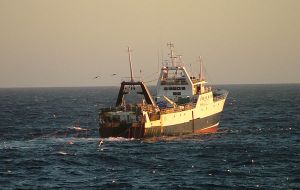MercoPress. South Atlantic News Agency
Back to the sea for Falklands fisheries research
 The new Fisheries Research vessel FV Castelo
The new Fisheries Research vessel FV Castelo AFTER eighteen months without a research vessel, the Fisheries Department (FIFD) will be back on the water in October 2009 with a survey in the western parts of the FICZ. The survey will examine the distribution and abundance of hoki and Patagonian hake returning to their feeding grounds after spawning in Argentinean and Chilean waters.
Dr Paul Brickle said, “Using a dedicated research vessel will allow us to conduct complex sampling stations, simultaneously collecting accurate data on catch weight and composition, oceanography and trawl geometry. These data will enable us to explain the distribution of biomass of various commercial species within Falkland Islands waters. Because we will be using one vessel and standard gear, stock assessment surveys will be more accurate, and we will have the flexibility to gain a greater insight into the Falkland Islands marine ecosystem, essential to the management of our fishery.”
After the departure of the Dorada in February 2008 FIG entered into a tender process in order to replace her. This resulted in a two vessel option: the FPV Protegat for Fisheries Patrol and the FV Castelo for Fisheries Research. The Castelo is a 1321 tonne, 67 m trawler and has been fishing in the Falkland Islands for some years; Castelo is owned by Ferralemes Ltd with Red Back Consultants (RBC) Ltd as the local joint venture.
Before fisheries research could take place on her, a number of modifications were required in order to comply with the specification laid out within the original tender document. Discussions with RBC Ltd and the members of the scientific section (FIFD) on other modifications resulted in what would be a well provisioned and technically sound research vessel. Two members of the scientific section spent the first few days of the Loligo pre-recruit survey (10th – 15th February 2009) on board the Castelo with the aim of suggesting further modification for the vessel’s research capabilities. Alterations to the vessel took place in Montevideo between the two Loligo seasons and included the construction of a dry lab a small redesign in the factory to allow a fluid movement of the catch through the vessel for research purposes. The vessel was also fitted with an oceanographic winch, essential for complex research.
Senior Scientist Dr Sasha Arkhipkin commented “This is a timely event as a research vessel is an essential tool to a fishery of this size. The Fisheries Department are delighted with the modifications to the vessel and the scientific section is looking forward to their first cruise on her in October 2009.”
By Lisa Johnston – SeAled PR - Stanley




Top Comments
Disclaimer & comment rulesCommenting for this story is now closed.
If you have a Facebook account, become a fan and comment on our Facebook Page!